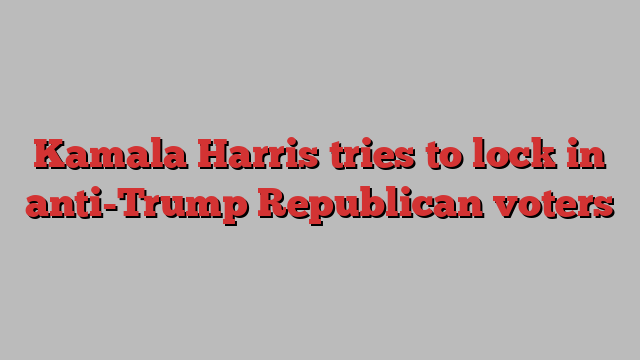
Unlock the US Election Countdown newsletter for free
The stories that matter on money and politics in the race for the White House
Former Republican congresswoman Liz Cheney will campaign with Kamala Harris in Wisconsin on Thursday, as the Democratic vice-president steps up efforts to win over Republicans unwilling to vote for Donald Trump.
Liz Cheney, the daughter of George W Bush’s vice-president Dick Cheney, last month endorsed Harris’s White House campaign as she warned of the “danger” of re-electing Trump. Dick Cheney subsequently also said he would vote for Harris.
The vice-president and Cheney will appear in the Wisconsin city of Ripon, considered the birthplace of the modern Republican party, a campaign official said.
Harris will say that while she and Republican voters may not agree on every policy issue, they can trust her to uphold the constitution and the rule of law, the official said.
The campaign stop, just a month ahead of the election, marks Harris’s most explicit attempt to lure Republicans who have been disenchanted with Trump’s control of their party — and whose votes could decide the election.
Cheney’s appearance in Wisconsin comes days after Jeff Flake, a former Republican senator from Arizona, announced he was also backing Harris, saying she represented a “new generation of leadership based not on grievances of the past, but hope for the future” — a pointed allusion to Trump.
In August, several former Trump administration officials and other big-name Republicans gave primetime speeches at the Democratic National Convention, and the Harris campaign has deployed prominent Republicans to campaign for her in battleground states.
The campaign has also invested heavily in advertising campaigns directed at moderate Republicans whose votes could be decisive in a gridlocked election.
The latest Financial Times poll tracker puts Harris slightly ahead of Trump nationally but in a split race in the swing states.
“[The Harris campaign] is doing a really good job of reaching out for us and, well, welcoming us into the fold,” said Geoff Duncan, the former Republican lieutenant-governor of Georgia who has criticised Trump for trying to overturn the 2020 election. Duncan spoke at the DNC in August and has since campaigned for Harris in his home state of Georgia, a swing state.
“[Harris] has really shown a willingness to listen to the thoughts and ideas of those of us in the middle,” Duncan added.
Other high-profile Republican Trump critics — including Utah senator Mitt Romney, former president George W Bush and former secretary of state Condoleezza Rice — have stopped short of endorsing Harris. Many of Trump’s other Republican detractors, most notably former South Carolina governor Nikki Haley, have now backed him.
Strategists say Harris could settle the contest with Trump if she wins a fraction of the Republican voters who backed Haley against him in their primary race this year.
A campaign group called “Haley Voters for Harris” on Wednesday announced a new “seven-figure” investment in its own advertising campaign targeting Haley primary voters.
In Pennsylvania, arguably the election’s most important swing state, more than 150,000 people, or nearly 17 per cent of Republican voters, picked Haley over Trump in April — even though she had abandoned her White House run two months earlier.
Now, some of those Haley supporters say they will vote for Harris.
Jack Merritt, a 74-year-old Republican from the Philadelphia suburbs who had previously told the FT he would spoil his ballot by voting for Haley in the general election, now says the vice-president has won him over.
“I remain a committed conservative,” Merritt said. “I don’t think she’s quite as liberal as people would like to paint her. Trump has got the potential of doing much more harm on the world stage than she would do . . . I have arrived at my least-bad choice.”
One former Republican official from a neighbouring Pennsylvania town said it was now “90 per cent certain” he would vote for Harris.
“Voting for Trump is not an option. I agree with former vice-president Cheney: he is a danger to the republic,” the former official added.
But other Haley primary voters in Pennsylvania contacted by the FT were unconvinced by Harris’s pitch, and suggested they might skip the top of the ticket altogether.
“I thought [Biden and Trump] were two bad choices,” said Marshall Lerner, a 73-year-old retiree who voted for Trump in 2016 and 2020 and remains undecided about November. “Today, I would have to say, I don’t like either candidate. They are still two bad choices.”